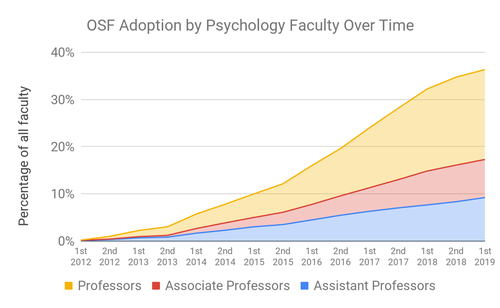OPEN SCIENCE
MedRxiv has ben announced. A preprint server for the health sciences, launching June 25. The project is a collaboration between Cold Spring Harbor Laboratory, Yale University, and BMJ.
Brian Nosek has been looking into the rise of open science in psychology, studying users on the Open Science Framework. Of 1,987 faculty at 69 psychology departments, 35% have an OSF account, with adoption gaining momentum, as shown in the figure below.
The Open Access Button has released shareyourpaper.org, where researchers can easily self-archive the author version of their paper to Zenodo.
This year’s theme of the International Open Access Week is “Open for Whom? Equity in Open Knowledge”
How will the emerging generation of scholars transform scholarly communication? A blog post by David Nicholas on a longitudinal study of early career researchers that has found a continuing focus on career incentives that are not lined up with the requirements of academic research: “The majority of ECRs understood impact as gaining a high impact factor, or influencing other researchers in the field. Citations remain the key measure/proxy of impact. Because of the highly competitive world they inhabit, ECRs are increasingly target-oriented in this respect. While most ECRs are sympathetic to addressing wider audiences, they are not making big strides in this direction.”
“The economic impacts of open science: a rapid evidence assessment” by Michael J. Fell is a preprint that reviews 21 studies from the literature on the economic benefits of open science. The study concludes an overall net benefit, even if cost items such as the preparation of datasets for public sharing are accounted for. Some of the economic benefits arise from a better economic use of research data and others from productivity gains, whereby researchers are able to discover and access research more efficiently.
PUBLISHING
The revised principles for Plan S have been published. Amongst the changes is a delay by a year to 2021, a weakening of some provisions for example around hybrid journals to allow for a transition period, and more relaxed criteria for repositories.
PLOS
Depositing and reporting of reagents. A blog post by Addgene on PLOS’ support of researchers sharing reagents and materials and the support for reagents repositories. Depositing materials in repositories reduces administrative burdens and provides quality control for improved reproducibility.
EVENTS
The FORCE11 Scholarly Communication Institute is taking place from 5 – 9 August, 2019, at UCLA, Los Angeles, CA.
The summer school on Open Science in Practice is from 2 – 6 September in Lausanne, Switzerland.

The adoption of Open Science Framework by psychology faculty.
Credit (CC-BY): Brian Nosek, The Rise of Open Science in Psychology, A Preliminary Report. 3 June, 2019.